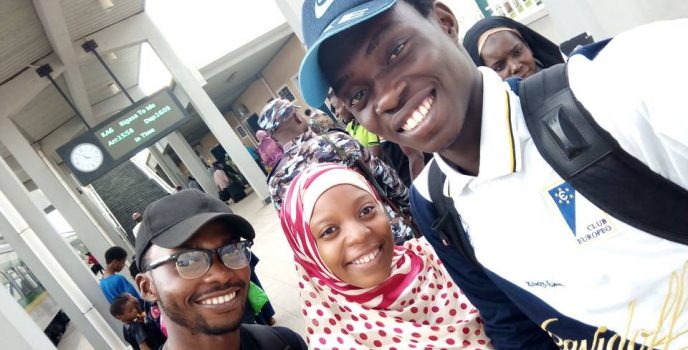Three Nigerian students from the Ahmadu Bello University (ABU) are billed to represent Nigeria at the ongoing Pan-African Robotics Competition (PARC) in Senegal this week. The competition is aimed at promoting STEM education and its application in Africa.
“These students would be showcasing robotics solutions they designed to solve African problems.” the Coordinator and Chief Executive Officer, Roboglobal Educational Consulting, Mrs. Remi Willoughby, said at a press conference in Lagos.
She also revealed that another five students would be representing Nigeria at the next First Global Robotic Olympics coming up in Mexico City in August.
According to Iroaganachi Udodirim, one of the students in Team Nigeria, the team will be showcasing their ability to generate electricity for a whole village. Over 170 teams will participate in this competition.
First Global, which is founded by a philanthropic inventor, Dean Kamen, aims to ignite a passion for science, technology leadership and innovation among more than two billion youths in the world.
First Global provides the framework for an Olympics-style robotics event that drives home the importance of obtaining science, technology, engineering, and mathematics skills needed by future leaders to overcome the greatest challenges facing the world – in the present and in the future.
The China Association of Science and Technology last week invited three secondary school students to represent Nigeria at the World Adolescent Robotics Competition.
The students, Tawakalitu Giwa, Oluwaseun Omotayo and Ayomide Adetunji, were also the members of Team Nigeria in the First Global Robotic Olympics held at Washington DC, United States, in 2017, which was sponsored by Aramex and Doculand Nigeria.
The sponsors said the students were picked based on their outstanding performance at the First Global Robotic Olympics where Nigeria ranked 25th out of the 163 teams from 157 countries, emerging third of the 41 African countries in attendance.
“Without any doubt, Nigeria is slowly but gradually establishing herself on the map when talking about technologically developed nations. This may not be presently evident; however, it is an indication that progress is being made,” Willoughby said.
She added, “We have the right talents to compete successfully on the global stage and move Nigeria to a technologically advanced nation. But we need the right support and encouragement to do this, we need to quickly address the evident deficit in science, technology, engineering and mathematics in our educational system.”
The Managing Director, Aramex and Doculand Nigeria and co-sponsor of the First Global project in Nigeria, Faisal Jarmakani, said, “These children are building the foundation blocks for a technologically advanced nation and in the next few years will become global icons paving the way for other children to follow. If they keep getting the right support and encouragement, without any doubt, we will soon join other countries of the world where science and technology have become the backbone of their economic development.”
Jarmakani explained that the decision to co-sponsor the new set of students for the next robotics Olympics in Mexico with his brother, Omar Jarmakani, was based on the need to encourage the youth to embrace technology and robotics.
Earlier in April, the Vice-President Yemi Osinbajo had praised the effort of Team Nigeria to the First Global Robotic Olympics for their outstanding performance at the challenge.
He made the commendation while receiving the six-member team, their project director, mentor and sponsors at the Aso Villa, Abuja.
Nigeria and Gabon are the only African countries invited to China’s World Adolescent Robotics Competition.
